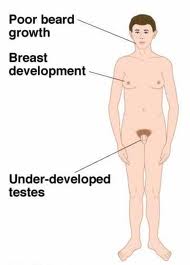[su_divider top=”no” style=”double” divider_color=”#952524″ link_color=”#952524″ size=”2″ margin=”10″]
What is klinefelter syndrome? How to manage it? What are the precautions to be taken? What are the signs and symptoms? What is the cause of this disease? How to treat it? How can homeopathy help you? All of this answered, in this post and of course our doctors always there to help you. Just fill in your details in the form down below and we will answer all your questions for FREE!
[su_divider top=”no” style=”double” divider_color=”#952524″ link_color=”#952524″ size=”2″ margin=”10″]
[sc name=”query”]

What is Klinefelter syndrome?
Klinefelter syndrome is the most common genetic disorder occurring in males leading to the occurrence of hypogonadism and infertility. Klinefelter syndrome or Klinefelter’s syndrome also known as XXY syndrome as the name itself represent is a genetic disorder in which there is the presence of one extra chromosome in the normal karyotype.
In Klinefelter’s syndrome, there are 47 chromosomes present rather than 46 chromosomes found in genetically normal humans. That extra one chromosome is X chromosome leading to change in the normal genetic genome of 46 chromosomes to 47 chromosomes.
This extra chromosome represents its own features in an individual. Females have an XX chromosomal makeup and males have XY, individuals with Klinefelter syndrome have at least two X chromosomes and at least one Y chromosome. Individuals who possess this extra chromosome are usually referred to as XXY males or 47, XXY males”.
Due to the occurrence of this extra chromosome in males, as it is a female chromosome so it leads to developing features due to this the most common features which represent Klinefelter’s syndrome are hypogonadism and infertility.
This syndrome is characterized by hypogonadism (small testes, azoospermia, and oligospermia) in late puberty there occur gynecomastia, psychosocial problems, in seminiferous tubules there occur fibrosis and increase in urinary gonadotrophin levels.
What is the Pathophysiology of Klinefelter syndrome?
The x chromosome carries genes that play roles in many systems of the body including the function of gonads, development of brain and growth. With the addition of extra X chromosome in the normal genotype which leads to many physical and cognitive abnormalities such as mental retardation.
Effect of this extra chromosome on different systems of the body are as follows: –
• This extra chromosome is usually acquired through an error of nondisjunction during parental gameto genesis.
• There occur severe skeletal and cardiovascular abnormalities of the individuals who are affected by Klinefelter’s syndrome.
• Due to the addition of this extra X chromosome affects the overall growth of different parts of the body most commonly affected are the reproductive system, skeletal system, and brain. In gonadal development, it leads to dysgenesis of somniferous tubules and infertility, along with that occur hypoplastic and malformed genitalia.
• The mental capacity of the patient is not like a normal individual who possesses 46 chromosomes. The intelligent quotient score of the patient suffering from Klinefelter’s syndrome is reduced by 15 points.
• Major sensory areas are affected like language, coordination, and expression.
• Males who suffer from Klinefelter’s syndrome are on a higher risk of acquiring autoimmune diseases, diabetes mellitus, leg ulcers, and osteoporosis, tumors of breast and germ cells, rheumatoid arthritis, systemic lupus erythematosus.
In Klinefelter’s syndrome there occurs primary testicular failure with an increase in gonadotrophin levels due to lack of feedback inhibition by the pituitary gland.
As there occur androgen hormone deficiency this lead to sparse or absent facial, pubic, axillary or body hair, muscle mass and strength is less, there is a feminine distribution of adipose tissue, gynecomastia testes and penis are small.
Who is more prone to get affected by Klinefelter syndrome?
Klinefelter’s syndrome as the term suggests the occurrence of the X chromosome in individuals who already have XY chromosome so it affects males.
What are the causes of Klinefelter syndrome?
The major cause of Klinefelter syndrome is the variation in genes. The extra x chromosome is retained at the time of gametogenesis (meiosis 1) due to non-dysfunction.
What are the signs and symptoms of Klinefelter syndrome?
• In children, muscles are weaker and strength is reduced.
• The children who are suffering from this syndrome tend to become taller than average.
• Body of the male have less facial and body hair, broader hips, and less muscular body.
• Males may have larger breasts, weaker bones, and low energy levels.
• The patient has a rounded body type with some degree of gynecomastia.
• Affected males are infertile or reduced fertility.
What are the investigations of Klinefelter syndrome?
Examination of the patient is the first step to investigate the case and this will review the following points: –
• Secondary sexual organs are absent.
• Testes small in size.
• Enlargement of the breast in males.
Other investigations are as follows: –
• Barr body observation is helpful to diagnose.
• Karyotype on lymphocytes will help to diagnose.
• Determination of sex chromatin.
Hormone assays:
• High serum levels of gonadotrophin hormones.
• High levels of FSH (follicle stimulating hormone).
• High levels of luteinizing hormone.
What is the differential diagnosis of Klinefelter syndrome?
• Fragile X syndrome.
• Kallman syndrome.
• Marfan syndrome.
What is the prognosis of Klinefelter syndrome?
When treatment is started at an early age, then some cases can be treated and can lead to normal life. But the cases in which the patient lost his sexual functions totally difficult to treat the case.
As it is a genetic abnormality change of karyotype is not possible.
The complication can be treated with medication like tumors, cardiovascular abnormalities.
What treatment is advised in cases of Klinefelter syndrome?
• The genetic reversal is not possible as it is a permanent change in the karyotype.
• Gynaecomastia can be treated with surgical procedures.
• Hormone disturbances can be treated by giving hormone therapy.
• Patients who are under psychological stress due to Klinefelter’s syndrome can be treated by counseling.
For more information, you can visit NIH and MayoClinic.
Klinefelter Syndrome
[su_divider divider_color=”#952524″ link_color=”#952524″ size=”2″ margin=”10″]
[sc name=”know-your-doctor”]
[sc name=”more-links-diseases”]

